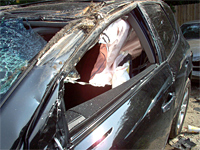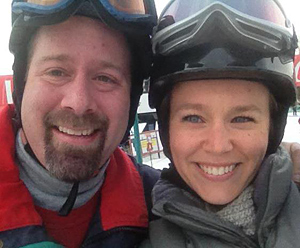Guest blogger: Jessica Burke
I could be a web developer anywhere. So, why do I choose to work at CDC’s Injury Center?
It’s because I know what it means to suffer a Traumatic Brain Injury (TBI). And I know how important it is to help prevent other people from going through what I went through one Thursday in August 2005.
That evening, I was in a car crash. As I was driving down a street in my neighborhood, another driver missed a stop sign on a cross street and struck me from the side. That set off a terrifying series of events – my car spun around, flipped upside down, and skidded at least 100 feet down the road. When the car finally stopped, my friends and I ended up suspended upside down in the car – the seatbelts the only things holding us in. Since it was late at night, we found ourselves even more disoriented in total darkness. The windshield was shattered, and the airbags created a curtain around the inside of the car. It must have been adrenaline that helped me manage to get myself and everyone else out of the car.
Bad enough were the glass pieces embedded in my leg, which later needed to be surgically removed, and the damaged discs in my neck. But most worrisome was the deep bleeding gash in my scalp, causing pain in my head like I had never experienced before in my life. Paramedics arrived, strapped me to a backboard, and took me to the emergency department, where I continued to be in pain with dizziness and nausea.
Before the crash, I had never had any type of head injury, but the excruciating pain let me know this injury could be very serious. Fortunately, my doctors told me that I would eventually recover from my concussion, but that the recovery would “simply take time.” For more than 6 weeks, my thought processes were slower, my short term memory was impaired, and in general I felt like I was trying to find my way through a dense fog while wading through molasses. The most difficult part of the recovery was not knowing when and if my brain would ever return to normal. This not knowing, combined with the constant pain and disorientation, increased my anxiety and aggravated my struggles with depression.
In my experience, TBIs really are a silent epidemic. People in my daily life had little or no knowledge of it, and could provide me with little or no support during my recovery. I wish I had known about the CDC Injury Center’s many TBI resources then. The information on our Concussion Recognition page could have helped me know that what I was feeling was completely normal. The Feel Better page would have been incredibly helpful in giving me instructions on how to care for my concussion. I also really wish my doctors had more information from the Clinical Diagnosis and Management page.
In my current position as a web developer, I am proud to be part of the development of the CDC Heads Up Facebook Page. This social community reaches multiple audiences with all aspects of TBIs: recognition by coaches, teachers and caregivers; clinical diagnosis and management; and a supportive community of survivors that share their stories, encourage one another, and share resources.
At the Injury Center I get the opportunity to work with the world’s top scientists and public health professionals in injury and violence prevention. Our work can help prevent car crashes that cause TBIs and other tragedies, provide prevention resources to parents to keep their kids safe, and help medical and public health professionals sharpen their expertise with the latest science on prevention and treatment.
Mainly, I work at the CDC Injury Center because I want to help the world prevent TBIs in the first place. But if they do happen, I never want another victim of TBI to ever have to go through their injury and recovery without the right information and support!




Public Comments
Comments listed below are posted by individuals not associated with CDC, unless otherwise stated. These comments do not represent the official views of CDC, and CDC does not guarantee that any information posted by individuals on this blog is correct, and disclaims any liability for any loss or damage resulting from reliance on any such information. Read more about our comment policy ».
June 5, 2012 at 4:23 pm ET - catherine
I was in an auto accident in 2006,I hit black ice and my vehicle went from wheels to roof at least 3 times and finally ended back on its wheels.The side window was smashed out and the sun roof was dented in with about six inches of room from my head. The jaws of life had to be used to get me out.I was taken to hospital diagnosed with a broken arm and a concussion and sent home.My Insurance Company Allstate has not being supportive in regards to my concussion and to this day six and a half years latter are stil not accepting the fact that it is a Brain Injury.I did not know that a Brain Injury could cause you that much trouble.Thank God I found your sight.I try to get as much information as I can to help me.I know that I am not alone now.
Thank you very much.
Link to this comment
June 9, 2012 at 9:24 am ET - Diane
Great blog post. I, too, have experienced TBI, on two separate occasions. Although it was many years ago, the CDC TBI resources helped me to look back on those experiences with more insight and gratitude that I made a full–if slow–recovery.
Link to this comment
June 12, 2012 at 10:44 am ET - Maddy
I have had 2 major head injuries. I have not fully recovered from my second one. I still have poor short term memory retention. I have difficulty learning new things. And suffer from depression.
I agree, I wish my doctors had more knowledge on the results and recovery of TBI. Like you I want to warn people of the effects of brain injuries, and I stress prevention with family and friends.
I was lucky, at the time of the TBI, my job required use of a CRT. I believe working on the computer help me recovery more of my brain.
Thank you, for sharing your story. You are so right, TBI is a hidden injury and people do not understand the confusion and fog the occurs with a TBI.
Link to this comment
June 22, 2012 at 12:40 pm ET - Kevin Hixson
Hi Jessica,
Thanks for sharing your experience with TBI. Your description “and in general I felt like I was trying to find my way through a dense fog while wading through molasses” captures the fragility of the human brain (and body), and yet your recovery is a testament to its resilience. I realize that the accident happened in 2005, but do you ever experience spells of memory loss or disorientation, or any other symptom? If so, how do you cope? Are there certain exercises you perform to reorient yourself?
Thank you again for your inspirational and informative story. I applaud your efforts to equip victims of TBI with the information they need to get through it.
- Kevin
Link to this comment
June 22, 2012 at 2:28 pm ET - Catherine Dodgens
Thanks so much for helping people new to this, I too was injured in 1997. My injury was at work, tripping on some boards that were covering a walkway, and ramming my head into a huge desk. You would be surprised how simple my injury sounds, but it changed my life forever~Post Tramatic Concussion Syndrome, Inner Ear Concussion, Neck Injury, and now 15yrs. later many pain pills, and I’m a whole different person. It’s important to let people know what to expect, no one tells them that~and with our Soldiers coming home with these injuries, like my inner ear concussion. We need to tell them…Thanks for helping:)
Link to this comment
July 10, 2012 at 8:47 am ET - On site Paramedics
I think your work is awesome I inspire your working it’s a nice planned company, Cary on
Link to this comment
July 19, 2012 at 2:59 pm ET - Shaun Best
I survived a fatal blow to the head, because I wasn’t wearing a helmet. Shouldn’t parental neglect should be punishable? This challenge/injury resulted in a three month coma at the age of 12. I’ve made a pretty good recovery such that I’ve conquered another 40 cognitive challenges. I work part-time as a substitute teacher, even after Artkansas proved me incompetent in federal court. Continue with your success, because many with negative stereotypes damning our recovery; it may happen! When negative educational self-fulfilling prophecy terms like, i.e., disabled, retarded, injuried, handicapped, etc., they (society) do not give us a real chance at rehabilitation.
I hope that my challenges enhance your view of yourself to succeed. Many said I would never, but I proved them wrong. You can too!!
Link to this comment
August 20, 2012 at 11:21 am ET - Erin
I am glad I read your post. I also got into a very bad car accident and suffered a severe tbi. I have no memory of anything that happened from the day of the accident until 4 months later. The nurses on duty would sedate me to an extent I could not move or stay awake. The information my family was given was that I would probably never be ‘normal’ again and would probably have to live in a nursing home the rest of my life. I refused to take these outcomes into consideration. I pushed myself to walk again now I am back in college and get nothing but A’s, I live with my two kids, manage my own life and can work. I have not heard or read anything about positive in regards to a tbi recovery, and because I look, act and talk as I used to other people do not understand why sometimes I seem to focus so intently on issues within my life and the people in it that make me angry, they tell me to just get over it. I tell them sometimes I can’t move past things that quickly.
Link to this comment
October 31, 2012 at 2:00 am ET - Kelly aron
After a long term period that a person is bombed is one way to diagnose how caustic the injury was. If you weren’t knock unconscious at all or if you were out for less than 30 minutes, your TBI was probably minor or mild.
Link to this comment